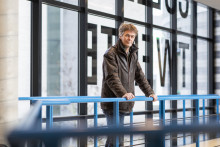How do you look back on this first year as UT ombudsman?
'I am very satisfied. I think the number and spread of cases strengthen me in that. In less than a year I had to deal with 39 cases. The confidential advisors receive twenty reports a year, the complaints committee a handful. Apparently there was room that had not yet been filled. In addition, the number of cases remains fairly stable, with an average of one new case per week. With the exception of an inexplicable gap in December last year, when I only had one case to deal with.'
Do you think your role and position are clear to the UT community?
'I am trying to make it more visible, but it is difficult to make propaganda for this position. I notice that the position of ombudsperson is becoming more firmly established within the house of integrity of the UT, but there are also important differences. A confidential adviser is primarily there for the reporter, and a complaints committee is there to pass judgment. I am not here to pass judgment, but to solve the problem. In the first instance, I am a listening ear. Often people simply get stuck, then I try to help them further as best I can. I do that from a neutral, independent role.'
Your role also differs from how other universities use their ombudsman?
'Right, that was also an interesting point from a recent mid-term review. We are one of the four universities that started this pilot and you see a different approach in it. Not every university has a complaints committee; the ombudsman has to both solve a case and pass judgment on it. The evaluation was critical of this dual role, while we are given every opportunity to continue along our chosen path. That inspires confidence, because I definitely feel that it works the way we do things.'
What did you notice about the cases last year?
'That there are all sorts of types, although it is striking that I have relatively many HR problems on my plate, I also wrote that in my annual report. That worries me and I think we need to find out how that is possible. On the one hand, it is not strange that people knock on the door about their employment position, but on the other hand, this is a high number. It would be good if we could reduce that number.
Incidentally, students don't report to me very often, but that's logical in view of their solid network of student advisors, student deans and psychologists. Employees in particular are now finding a solution that they apparently did not have before. I am very satisfied with that. Also about the general attitude within the UT. It's not always possible to bridge conflicts of interest, but the good will is certainly there.'
You also have a signalling function. From there you expressed your concerns about the position of PhD candidates.
'It regularly happens that scientists with grants leave for another employer. This creates enormous uncertainty for PhD students who are in the care of that scientist: can they complete their PhD trajectory? Certainly for people from abroad, the consequences can be far-reaching. They are cases where you expect policy to be in place, but that did not appear to be the case. That is why I have raised this problem with the Executive Board. After consultation with the Twente Graduate School and the Board of Doctoral degrees, there is now a decision in principle to strengthen the position of PhD candidates in such cases.
In any case, I try to pick out at least one development each year and bring it to the attention of the Executive Board. There is work to be done in the area of diversity and inclusion, for instance, but I still have too little information to contribute. It is, however, a theme on which I want to focus together with our new diversity & inclusion officer.'
This ombudspilot will end in mid-2021. And then what?
'The ombudsfunction will remain, as stated in the new collective labour agreement (cao, ed.). The discussion about the form still has to take place within the UT. I can say that this pilot does not stand in the way of a good follow-up. The interim evaluation was also positive and I feel that my job offers added value for the university's support structure.'






